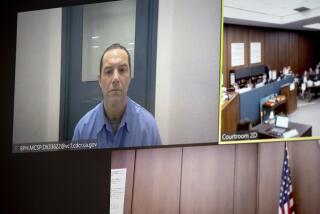3rd Trial Scheduled for Suspect in Boy’s Death : Pathologist’s Errors in Handling Slide Tissues From Child’s Body Termed ‘Minimal’ by Judge
- Share via
A Superior Court judge ruled Tuesday that a pathologist’s mishandling of laboratory evidence is not sufficient grounds to dismiss a murder case against Darrell Roberts, who has already gone through two mistrials on charges of killing his girlfriend’s 2-year-old son.
Judge David O. Carter not only called the late pathologist Walter Fischer’s errors “minimal,” he praised Fischer for bringing the errors to the court’s attention.
Fischer, 56, who performed autopsies for the county under contract, was found dead two months ago and the county coroner’s office ruled the death a suicide. His partners have said they believe he was despondent over unfavorable publicity about his work, particularly about his errors in the Roberts case.
Fischer had been the key witness against Roberts, 32, at Roberts’ first trial two years ago, which ended in a hung jury, with the jurors voting 9 to 3 for acquittal.
Fischer testified that the child, Julius Caesar Mathis Jr., had been injured two to four hours before his death. During that period of time, the child was in Roberts’ care while the mother was at work. Fischer’s testimony was based on a study of 36 slides of tissue taken from the boy’s body.
When Roberts’ second trial got under way in April, Fischer told the court he had discovered a shoe box full of tissue slides--a second set of 36--which had not been available to either the prosecution or the defense at the first trial.
Carter declared a second mistrial and conducted a hearing to look into the missing evidence.
In five days of testimony, Fischer said the tissue slides in the shoe box only reinforced his findings at the first trial and would not have been favorable to the defense in any case. But he also acknowledged that a block of tissue from which slides had been made and one of the tissue slides itself were still missing.
‘Unfair Burden’
Roberts’ attorney, Milton Grimes, asked that the case be dismissed, claiming that Roberts cannot get a fair trial because “the way Dr. Fischer’s records were kept, who knows how many slides may be missing? With some evidence misplaced, some of it gone, it’s an unfair burden for the defense.”
Judge Carter did not agree. The judge said that the organs from which the blocks of tissue were taken to make the slides have been preserved, and new blocks can be made if needed.
“What Dr. Fischer did took a lot of courage,” Carter said. “He could have kept quiet about the slides he found in the shoe box and nobody would have ever known. He admitted his errors, which was the decent thing to do.”
But Carter added that he plans to let the jury know “the totality of all the evidence” about the misplaced slides, plus the missing slide and missing block of tissue.
“I found Fischer’s testimony credible, and I think the damage caused by what happened to the slides is minimal,” Carter said in an interview later. “But it’s something I want the jury to decide.”
Suspicions Voiced
Grimes also said it was highly suspicious that Fischer’s bookkeeping on the Mathis case showed several erasures, a clear insinuation that the records had been faked. But Carter found that there was no evidence to show there was any wrongdoing in the record-keeping.
Carter set a Jan. 13, 1986, trial date.
Roberts, who has been free on $100,000 bail, did not let his disappointment show after Carter’s ruling.
“It was just another day in court,” he deadpanned.
Five Months in Jail
Roberts has had murder charges pending against him now for 3 1/2 years. He was arrested nine months after the child’s death on Aug. 21, 1981, and spent five months in jail before his family could make bail.
Grimes predicted that “there is no way in hell a jury is ever going to convict Darrell, not after all that’s happened in this case.”
‘Problems Not Insurmountable’
Deputy Dist. Atty. Frank Carroll said that Fischer’s death “poses some problems for us, I’ll be honest about it. But those problems are not insurmountable.”
Asked if he thought he could gain a conviction, considering the first jury’s 9-3 vote for acquittal, he said, “I think the evidence can be more forcefully presented than it was at the first trial.”
More to Read
Sign up for Essential California
The most important California stories and recommendations in your inbox every morning.
You may occasionally receive promotional content from the Los Angeles Times.










